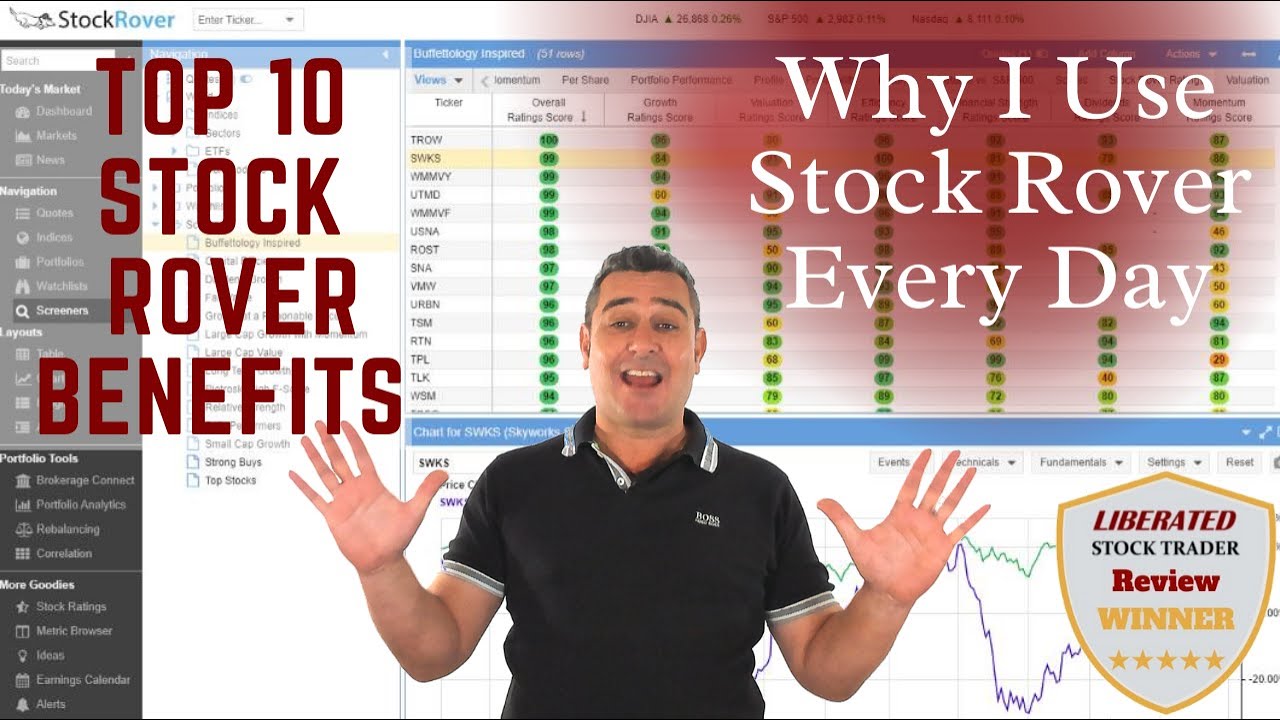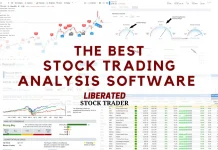A blue-chip stock is a well-established, financially sound company with an excellent track record of strong performance and stability.
☆ Research You Can Trust ☆
My analysis, research, and testing stems from 25 years of trading experience and my Financial Technician Certification with the International Federation of Technical Analysts.
Blue chips are large companies in mature industries that pay regular dividends. Examples of blue-chip stocks include Apple, Microsoft, Boeing, Coca-Cola, IBM, and Visa.
This research provides a real-time blue chip stock list, plus smart ways to find your ideal blue chips using proven financial metrics.
Key Takeaways
- The term “blue chip” comes from poker, where a blue chip is the highest-value chip players can bet.
- Blue chip stocks are considered the most valuable and safest investment option an investor can choose.
- Blue chip stocks are considered less risky because they come from companies that have been around for a long time, survived multiple recessions, and have a good reputation.
- Blue chip companies usually have a market capitalization of over $50B and pay regular dividends.

What are blue chip stocks?
Blue-chip stocks are large, established, reputable companies with a history of success. They’re considered the “safest” stock investment because they have typically survived multiple economic cycles and come out stronger. They also tend to pay regular dividends and have low volatility, making them popular among dividend investors.
Many consider a blue-chip stock the gold standard in investing, but its price can still fluctuate.
What does blue chip mean in stocks?
The term “blue chip” comes from poker, where a blue chip is the highest-value chip players can bet. In the same way, blue chip stocks are considered the most valuable and safest investment option an investor can choose.
Are blue chip stocks less risky?
Blue chip stocks are considered less risky because they come from companies that have been around for a long time and have a good reputation. These companies are typically more stable and have a history of growth.
Pros
The benefits of investing in blue chip stocks are that they offer lower risk, lower volatility, and have a long-term track record of solid performance. Additionally, they often pay steady dividends, providing income over time. Blue chip stocks also offer diversification for your portfolio as they provide exposure to different industries and sectors. Lastly, these stocks tend to hold their value better during a bear market.
Investors who buy blue-chip stocks can benefit in several ways. First, they invest in companies considered safe with leading products and services. Second, these stocks usually have a history of stability and growth, which means they may be more likely to increase in value over time. Finally, many blue-chip stocks pay dividends, which is income that investors receive from the company regularly.
Cons
Yes, risks are always associated with any stock, including blue-chip stocks. The price of these stocks can still fluctuate, and there is no guarantee that they will increase in value over time. However, if you are willing to take risks, blue-chip stocks can be a great investment option.
While blue chip stocks tend to be less risky than other types of stocks, there is still the potential for loss. Additionally, these stocks may not provide the same growth potential as smaller, more innovative companies.
Financial criteria for blue chip companies
Important criteria for finding blue chip stocks are a market capitalization of over $50 billion, a regular dividend payment, a dividend yield above 1.5%, and earnings growth. Some analysts define blue chip stocks as the 30 largest, most established companies in the Dow Jones Industrial Average.
Well-known blue chip stocks
The well-known blue chip stocks include Apple, Microsoft, Amazon, Coca-Cola, Walmart, ExxonMobil, IBM, McDonald’s and Johnson & Johnson. These companies pay dividends and have a low beta volatility rating.
Why you should invest in blue chip stocks?
Blue chip stocks may be a good choice if you’re looking for stability and income. These stocks have an excellent track record of growth, are less volatile than the overall market, and have a history of paying dividends. However, during business cycles, some blue chips become less innovative, and their prices may decline. Overall, investing in blue chips can be a great way to diversify your portfolio and achieve long-term capital growth.
How do you invest in blue chip stocks?
There are a few different ways to invest in blue chip stocks. One option is to buy the stock of a well-known company directly. Another option is investing in a mutual or exchange-traded fund (ETF) specializing in blue chips.
A blue-chip fund is a type of ETF or mutual fund that invests in stocks of well-known, large companies. These companies are usually considered low-risk investments, and the blue-chip mutual fund is therefore considered a low-risk investment option. Many blue chip mutual funds also pay dividends to their investors, making them an attractive option for those looking for regular income payments.
A quick list of 10 top blue chip stocks
- Apple
- PepsiCo
- Walmart
- IBM
- Microsoft
- Visa
- ExxonMobil
- Johnson & Johnson
- JPMorgan Chase
What is the difference between blue chip stocks and penny stocks?
The main difference between blue chip stocks and penny stocks is risk. Blue chip stocks tend to be large, established companies less likely to experience drastic price swings. On the other hand, Penny stocks are small-cap companies with a lower market capitalization that are more volatile, less liquid, and manipulated by market makers.
5 tips for investing in blue chip stocks?
Here are a few tips for investing in blue-chip stocks:
- Look for companies with a history of paying dividends, as this can provide you with a source of income and help you gauge the company’s stability.
- Consider investing in a mutual fund or ETF specializing in blue chips to help you diversify your portfolio and reduce risk.
- Keep an eye on the overall market. Blue chip stocks tend to be less volatile than the market, but they can still be affected by broader economic trends.
- Remember that no investment is without risk. Even though blue chip stocks are typically less risky than other types of stocks, there is still the potential for loss.
- Do your research. Don’t just blindly follow the advice of others when it comes to investing in blue chips. Due diligence is important to determine if a stock is right for you.
Up-to-date Interactive List of Blue Chip Stocks
Our interactive stock screener by TradingView sorts the largest capitalization stocks on the US stock market, including earnings, PE Ratio, and growth.
Try TradingView’s Excellent Stock Screening for Free
Criteria to find high-quality blue chip stocks
You can find high-quality blue chip companies by using a stock screener to filter on the following proven financial criteria:
- Market capitalization over $50B
- Beta < 1
- Dividend Yield > 1%
- Dividend 5-Year Average > 2%
- EPS 5-Year Average > 2%
These criteria ensure you find large companies with average or below-average beta (low volatility) and modest dividend growth over the past five years. The hope is to find low-risk, slow-growing companies similar to those on the DJIA. If you want to make it even easier, follow the steps below to implement the stock screening in 4 steps.
Investing In Stocks Can Be Complicated, Stock Rover Makes It Easy.
Stock Rover is our #1 rated stock investing tool for:
★ Growth Investing - With industry Leading Research Reports ★
★ Value Investing - Find Value Stocks Using Warren Buffett's Strategies ★
★ Income Investing - Harvest Safe Regular Dividends from Stocks ★

"I have been researching and investing in stocks for 20 years! I now manage all my stock investments using Stock Rover." Barry D. Moore - Founder: LiberatedStockTrader.com
4 Steps to find the best blue chip companies.
- Register for free with Stock Rover, our favorite stock screener.
- Select Library
- Search for “Blue Chip Finder”
- Click Import Screener -> OK
Now, you have a list of great blue-chip stocks worthy of investment. Here is the list of Stock Rover’s best blue chip stocks.
Blue Chip Stocks List by EPS, Dividend Yield, & Market Cap.
According to research at Stock Rover, the best blue chip stocks based on EPS and dividend yield for 2023/2024 are Thomson Reuters, Phillips 66, Marathon Petroleum, Deere, Linde, and Oracle.
| Ticker | Company | EPS 1-Year Chg (%) | Dividend Yield | Market Cap $M |
| TRI | Thomson Reuters | 267.50% | 1.60% | $57,060 |
| PSX | Phillips 66 | 96.50% | 3.50% | $53,416 |
| MPC | Marathon Petroleum | 88.90% | 1.90% | $61,799 |
| DE | Deere | 68.70% | 1.40% | $110,041 |
| LIN | Linde | 65.80% | 1.40% | $182,756 |
| ORCL | Oracle | 59.70% | 1.50% | $296,256 |
| LMT | Lockheed Martin | 57.70% | 2.90% | $104,104 |
| EQNR | Equinor | 52.50% | 3.70% | $96,714 |
| EOG | EOG Resources | 52.20% | 2.60% | $72,927 |
| NTES | NetEase | 45.40% | 1.70% | $66,266 |
| MCD | McDonald’s | 33.60% | 2.30% | $196,714 |
| GILD | Gilead Sciences | 33.00% | 4.00% | $93,039 |
| SYK | Stryker | 30.40% | 1.10% | $108,675 |
| CAT | Caterpillar | 28.60% | 1.90% | $139,281 |
| AMGN | Amgen | 26.20% | 3.20% | $142,032 |
| BMY | Bristol-Myers Squibb | 24.90% | 3.90% | $123,100 |
| TJX | TJX Companies | 21.80% | 1.50% | $101,582 |
| AMX | America Movil | 21.10% | 4.10% | $54,861 |
| DEO | Diageo | 17.70% | 2.60% | $85,679 |
| ADP | Automatic Data Processing | 17.30% | 2.10% | $98,234 |
| UNH | UnitedHealth Group | 16.70% | 1.40% | $469,951 |
| ATVI | Activision Blizzard | 14.20% | 1.10% | $73,958 |
| RELX | RELX | 12.90% | 2.10% | $64,397 |
| SCHW | Charles Schwab | 12.80% | 1.80% | $100,698 |
| EPD | Enterprise Prods Partners | 11.30% | 7.30% | $59,918 |
| HON | Honeywell Intl | 10.20% | 2.20% | $125,687 |
| KO | Coca-Cola | 9.50% | 3.20% | $246,725 |
| MDLZ | Mondelez International | 9.50% | 2.40% | $95,072 |
| CSCO | Cisco Systems | 8.90% | 2.90% | $215,900 |
| WM | Waste Management | 8.80% | 1.80% | $63,727 |
| ELV | Elevance Health | 7.60% | 1.30% | $106,474 |
| CVX | Chevron | 5.20% | 3.60% | $319,636 |
| GD | General Dynamics | 3.20% | 2.40% | $59,602 |
| PG | Procter & Gamble | 1.50% | 2.50% | $354,915 |
| SO | Southern | -0.70% | 4.00% | $74,974 |
| MMC | Marsh & McLennan | -0.80% | 1.50% | $96,344 |
| TD | Toronto-Dominion Bank | -2.00% | 4.70% | $110,690 |
| APD | Air Products & Chemicals | -2.50% | 2.40% | $63,875 |
| RY | Royal Bank of Canada | -5.70% | 4.50% | $124,196 |
| COP | ConocoPhillips | -13.90% | 2.00% | $144,560 |
| PEP | PepsiCo | -14.00% | 2.80% | $239,958 |
| CB | Chubb | -15.40% | 1.60% | $86,857 |
| NOC | Northrop Grumman | -15.80% | 1.80% | $64,358 |
| BDX | Becton Dickinson | -16.00% | 1.40% | $76,877 |
| ENB | Enbridge | -22.00% | 7.60% | $73,161 |
| JNJ | Johnson & Johnson | -28.20% | 3.00% | $383,235 |
| ABBV | AbbVie | -31.30% | 3.90% | $270,087 |
| ABT | Abbott Laboratories | -38.80% | 2.10% | $169,587 |
| BMO | Bank of Montreal | -39.20% | 5.10% | $61,122 |
| GS | Goldman Sachs Gr | -46.90% | 3.40% | $107,979 |
| MRK | Merck & Co | -81.40% | 2.80% | $267,796 |
Get the Latest Blue Chip List at Stock Rover
How to Get This Blue Chip List in Excel
- Drag Your Mouse Over the Table
- Right Click -> Select Copy
- Open Excel
- Right Click the First Cell A1 -> Click Paste
Summary
Blue chip stocks are considered some of the safest and most reliable investments. They are often large, well-established companies with good reputations. However, they can also be cyclical stocks that fluctuate with the economy and business climate. If you’re considering investing in blue chip stocks, it’s important to research first.
Blue Chip Stocks FAQ
What is the best software for finding blue-chip stocks?
Our testing shows that Stock Rover is the best screening software for researching and investing in blue-chip stocks. Stock Rover's built-in blue-chip screeners and research tools will help you find financially strong companies.
Do blue chip stocks pay dividends?
Yes, many blue-chip stocks pay dividends to their investors. This is money that the company pays out regularly, usually quarterly or annually. Dividends can be a great way to generate income from your investments, and they can be especially helpful if you are retired and rely on your portfolio to provide you with income.
Do all blue-chip stocks pay dividends?
Not all blue chip stocks pay dividends, but many of them do. So if this is an important factor for you when choosing a stock, look for companies that offer this type of payout.
How much are blue chip stocks?
Blue chip stocks are typically priced over $10, but the stock price is unimportant. The number of shares outstanding multiplied by the stock price equates to market capitalization, which is an important factor.
How to trade blue chip stocks?
Blue chip stocks can be traded similarly to any other type of stock. You can buy and sell them on a stock exchange through an online trading platform. Blue-chip stocks are not ideal for active day trading unless the company is going through significant turmoil leading to increased volatility.
Is PepsiCo a blue chip stock?
Many people consider PepsiCo to be a blue-chip stock. The company is well-established and has a good reputation, and it is seen as being less risky than other types of stocks. However, PepsiCo’s shares can still fluctuate in price like any stock. So it’s important to do your research before investing in this type of stock.
Is Apple a blue chip stock?
Yes, Apple is a gold-standard blue chip stock as it pays dividends and has industry-leading products, gross margin, and market-beating performance.
What’s the difference between a blue chip and a penny stock?
There are several key differences between blue chip stocks and penny stocks. Blue chip stocks are typically from large and well-established companies, while penny stocks come from smaller businesses that may be less reliable. Blue chip stocks are also generally less risky than penny stocks. Finally, blue chip stocks tend to be more expensive than penny stocks. So, if you’re investing in a blue chip stock, it’s important to research and understand the risks involved.
Is Tesla a blue-chip stock?
No, Tesla is not considered to be a blue-chip stock. Although it is a high-growth company with stellar performance, it does not pay dividends, and its shares are highly volatile. Tesla is seen as riskier than some other types of stocks. This does not mean Tesla is a bad investment, but you must understand the risks involved.
Is Amazon a blue chip stock?
Yes, Amazon is considered by some to be a blue chip stock, as it has a solid history of stock price growth and industry dominance. However, it does not pay a dividend making it unsuitable for some blue-chip investors.
Is Netflix a blue-chip stock?
Netflix is not considered to be a blue-chip stock. Although it is a well-established company, its shares can still be very volatile, and its future price is based on subscriber growth. Additionally, Netflix has a high price-earnings ratio and high original content investments, making it a poor choice for a stable investment.
Is Alibaba a blue-chip stock?
Alibaba is not regarded as a blue chip stock by Wall Street. Although it is a well-established firm, its share price has been crushed and lost over 75% of its value due to Chinese government interference and dubious accounting practices.
Is AMC a blue chip stock?
AMC is not classified as a blue chip stock because even though it’s a well-known company, it has a poor business model and is barely profitable. AMC is a Meme stock manipulated by retail traders in a cat-and-mouse short squeeze play.
Is Boeing a blue chip stock?
Boeing is often considered to be a blue-chip stock. This is because it is a large and well-established company with a good reputation. However, Boeing is also considered a cyclical stock that fluctuates with the economy and business climate.
Are blue chip stocks safe?
Blue chip stocks are often considered less risky than other stocks, but they can still fluctuate in price. Because of this, some investors shy away from them, believing they aren’t worth the risk. However, if you know what you’re doing and are willing to take on a bit more risk, blue chip stocks can be a great investment option.






















